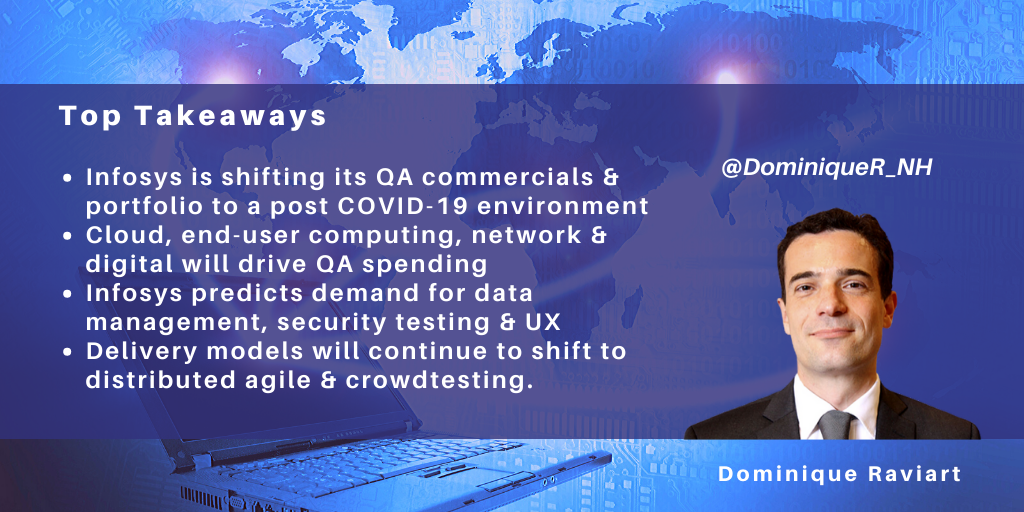Search posts by keywords:
Filter posts by author:
Related Reports
Related NEAT Reports
Other blog posts
posted on Apr 16, 2020 by Dominique Raviart

We recently talked to Shishank Gupta, the practice head of Infosys Validation Services (IVS), about how the practice is adapting to the COVID-19 pandemic and ensuing economic crisis. Of course, the initial focus has been on employee health, helping clients, and enabling its employees to work from home, getting access to tools, applications, and connectivity.
The QA practice is gradually moving on from this phase: Mr. Gupta highlights that clients are starting now to reconsider the contracts they have in place, discussing the scope and prioritizing activities across run-the-business and change-the-business. Unsurprisingly, new deals are on hold as clients lack visibility of the short-term future.
COVID-19 Accelerates the Shift to Digital
Infosys Validation Services is also busy preparing for the post-COVID-19 world and what that will mean in terms of clients shifting their QA needs. On the delivery side, the practice is expecting that client acceptance for home working and distributed agile will increase. This will drive usage of cloud computing, collaboration tools, and virtual desktops, along with increased telecom connectivity.
The pandemic will accelerate the shift in IT budgets to digital, particularly in retail, government services, and healthcare, the latter with renewed spending in health systems, telemedicine, collecting health data, and clinical trials (resulting from increased drug discovery activity). Shishank Gupta also expects that demand for UX testing will grow alongside the growth in digital projects. He also anticipates a continued acceleration of digital learning adoption that will create further testing opportunities across applications and IT infrastructures.
Infosys is Changing its Go-To-Market Priorities
Infosys’ IVS practice is realigning its go-to-market priorities and emphasizing existing offerings that had previously generated only moderate client appetite but have potential for growth in a post COVID-19 world. One example of such an offering is in the area of data masking that IVS had created several years ago for financial services clients for anonymizing their production data for usage as test data. IVS expects new delivery models to drive demand around capabilities such as data security and privacy, risk, and compliance audits.
IVS also expects accelerated adoption of cloud computing both in terms of testing applications to the cloud and SaaS adoption.
Finally, Infosys IVS is increasing its go-to-market effort around crowdtesting. The practice highlights that security concerns were a barrier to crowdtesting’s commercial development. Mr. Gupta now expects clients will adopt crowdtesting as a service and require fewer background checks on the crowdtesters.
And, of course, Infosys knows the world post-COVID-19 will also require leaner operations and lower costs: IVS is expanding its commercial focus on testing open-source software, test process re-engineering combined with RPA. Mr. Gupta highlights an ongoing project with an APAC investment firm where it is deploying RPA tools to automate the monitoring of applications in production and feedback to QA and business users.
QA Becomes Less Internally Focused and More Digital
NelsonHall expects that the role of testing will become less focused on internal transformation (e.g. test process standardization and TCoE setup) and become more integrated within digital transformation programs, where testing is part of the required services.
Currently, clients are continuing to focus on the immediate imperative of business continuity. NelsonHall expects that, in a post-COVID-19 world, clients will make strategic decisions, including accelerating their cost savings programs, driving offshore adoption and distributed agile, and also renegotiating their existing multi-year managed testing services contracts. In parallel, they will redirect some of their savings to the digital-led QA activities that Shishank Gupta has described.
In this new world, enterprises will need a QA partner that offers both onshore advisory capabilities to shift their QA spending to change-the-business, and further offshoring and automation to reduce their run-the-business spending.

Apr 18, 2020, by Ramanath Suryaprakash